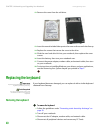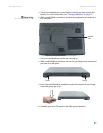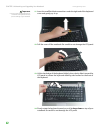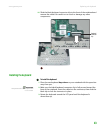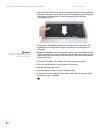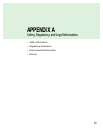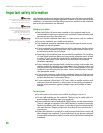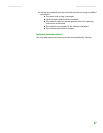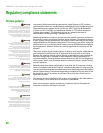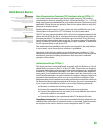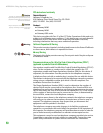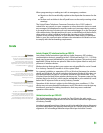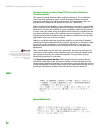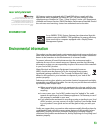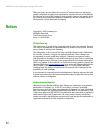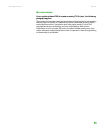
APPENDIX A: Safety, Regulatory, and Legal Information www.gateway.com
48
Regulatory compliance statements
Wireless guidance
Warning
Radio frequency wireless communication
can interfere with equipment on
commercial aircraft. Current aviation
regulations require wireless devices to be
turned off while traveling in an airplane.
802.11b (also known as wireless Ethernet
or Wifi) and Bluetooth communication
devices are examples of devices that
provide wireless communication.
Warning
In environments where the risk of
interference to other devices or services is
harmful or perceived as harmful, the
option to use a wireless device may be
restricted or eliminated. Airports,
Hospitals, and Oxygen or flammable gas
laden atmospheres are limited examples
where use of wireless devices may be
restricted or eliminated. When in
environments where you are uncertain of
the sanction to use wireless devices, ask
the applicable authority for
authorization prior to use or turning on
the wireless device.
Warning
If your notebook came equipped with an
internal embedded wireless device, do
not operate the wireless device unless all
covers and shields are in place and the
notebook is fully assembled.
Caution
Wireless devices are not user serviceable.
Do not modify them in any way.
Modification to a wireless device will void
the authorization to use it. Please contact
Gateway for service.
Caution
Only use drivers approved for the country
in which the device will be used. See the
Gateway System Restoration Kit, or
contact Gateway Customer Care for
additional information.
Important
Every country has different restrictions on
the use of wireless devices. Since your
notebook is equipped with a wireless
device, when traveling between countries
with your notebook, check with the local
Radio Approval authorities prior to any
move or trip for any restrictions on the
use of a wireless device in the destination
country.
Low power, Radio transmitting type devices (radio frequency (RF) wireless
communication devices), may be present (embedded) in your notebook system.
These devices may operate in the 2.4 GHz (i.e. 802.11b/g LAN & Bluetooth),
5.2 GHz (i.e. 802.11a LAN), and traditional cellular or PCS cellular bands (i.e.
Cellular data modem). The following section is a general overview of
considerations while operating a wireless device.
Additional limitations, cautions, and concerns for specific countries are listed in
the specific country sections (or country group sections). The wireless devices
in your system are only qualified for use in the countries identified by the Radio
Approval Marks on the system rating label. If the country you will be using the
wireless device in, is not listed, please contact your local Radio Approval agency
for requirements. Wireless devices are closely regulated and use may not be
allowed.
The power output of the wireless device or devices that may be embedded in
your notebook is well below the RF exposure limits as known at this time.
Because the wireless devices (which may be embedded into your notebook)
emit less energy than is allowed in radio frequency safety standards and
recommendations, Gateway believes these devices are safe for use. Regardless
of the power levels, care should be taken to minimize human contact during
normal operation.
Measurements have been performed to show that the RF exposure is below
what is considered safe limits; however care should be taken to make sure the
user or bystanders keep the transmitter away from their body when the wireless
device is transmitting. The transmitting antenna installed in the top third of the
lid should be used in a manner to maintain 20 cm (8 inches) from user’s or
bystander’s bodies.
The wireless devices installed in this system are intended to be used indoors.
In some areas, use of these devices outdoors is prohibited.
Some circumstances require restrictions on wireless devices. Examples of
common restrictions are listed to the left.



